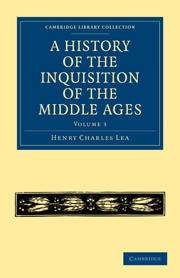Book contents
- Frontmatter
- Contents
- BOOK III SPECIAL FIELDS OF INQUISITORIAL ACTIVITY
- CHAPTER I THE SPIRITUAL FRANCISCANS
- CHAPTER II GUGLIELMA AND DOLCINO
- CHAPTER III THE FRATICELLI
- CHAPTER IV POLITICAL HERESY UTILIZED BY THE CHURCH
- CHAPTER V POLITICAL HERESY UTILIZED BY THE STATE
- CHAPTER VI SORCERY AND OCCULT ARTS
- CHAPTER VII WITCHCRAFT
- CHAPTER VIII INTELLECT AND FAITH
- CHAPTER IX CONCLUSION
- APPENDIX OF DOCUMENTS
- INDEX
CHAPTER VIII - INTELLECT AND FAITH
Published online by Cambridge University Press: 29 August 2010
- Frontmatter
- Contents
- BOOK III SPECIAL FIELDS OF INQUISITORIAL ACTIVITY
- CHAPTER I THE SPIRITUAL FRANCISCANS
- CHAPTER II GUGLIELMA AND DOLCINO
- CHAPTER III THE FRATICELLI
- CHAPTER IV POLITICAL HERESY UTILIZED BY THE CHURCH
- CHAPTER V POLITICAL HERESY UTILIZED BY THE STATE
- CHAPTER VI SORCERY AND OCCULT ARTS
- CHAPTER VII WITCHCRAFT
- CHAPTER VIII INTELLECT AND FAITH
- CHAPTER IX CONCLUSION
- APPENDIX OF DOCUMENTS
- INDEX
Summary
The only heresies which really troubled the Church were those which obtained currency among the people unassisted by the ingenious quodlibets of dialecticians. Possibly there may be an exception to this in the theories of the Brethren of the Free Spirit, which apparently owed their origin to the speculations of Amaury of Bène and David of Dinant; but, as a whole, the Cathari and the Waldenses, the Spirituals and the Fraticelli, even the Hussites, had little or nothing in common with the fine-spun cobwebs of the schoolmen. For a heresy to take root and bear fruit, it must be able to inspire the zeal of martyrdom; and for this it must spring from the heart, and not from the brain. We have seen how, during centuries, multitudes were ready to face death in its most awful form rather than abandon beliefs in which were entwined their sentiments and feelings and their hopes of the hereafter ; but history records few cases, from Abelard to Master Eckart and Galileo, in which intellectual conceptions, however firmly entertained, were strong enough to lead to the sacrifice. It is sentiment rather than reason which renders heretics dangerous; and all the pride of intellect was insufficient to nerve the scholar to maintain his thesis with the unfaltering resolution which enabled the peasant to approach the stake singing hymns and joyfully welcoming the flames which were to bear him to salvation.
The schools, consequently, have little to show us in the shape of contests between free thought and authority pushed to the point of invoking the methods of the Inquisition.
- Type
- Chapter
- Information
- A History of the Inquisition of the Middle Ages , pp. 550 - 615Publisher: Cambridge University PressPrint publication year: 2010First published in: 1888

